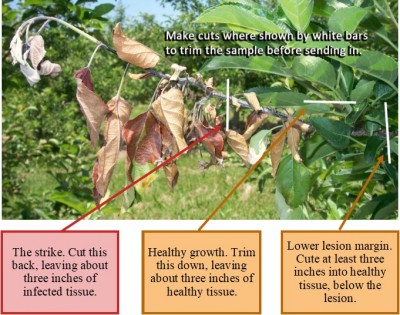2019 Fire Blight Survey
Mike Basedow, Tree Fruit Specialist
Eastern New York Commercial Horticulture

Kerik Cox's lab will be conducting a fire blight survey again this year, investigating streptomycin resistance and strain distribution across NY State and New England.
In the event fire blight does show up in your orchard, please send a sample to our lab!
You may take a sample yourself as outlined in the sample form on page 11, or you may wish to contact Dan Donahue or Mike Basedow to come and help you collect the sample.
It is imperative that we receive living (green) cambium tissue from the canker margin (i.e. where the necrotic and healthy tissue meet). Otherwise, the pathogen cannot be isolated. Samples should be sent as soon as possible after being removed from the tree, and kept cool if possible.
Samples submitted without the form will not be processed!
Instructions for sampling: It is only possible to isolate the bacteria (Erwinia amylovora) from fresh, active lesions, where healthy tissue meets the diseased tissue, i.e. the lesion margin. It is impossible to isolate fire blight bacteria from dead, dried out tissue.
The Lesion Margin: Collect samples that include about 3 inches of healthy tissue beyond the infected tissue, and include about 3 inches of infected tissue. Do not submit all the dead branch of the strike, this is often too long and can be cut back, as described, to 3 inches of infected tissue above 3 inches of healthy tissue. If possible, refrigerate infected trees and strikes. Protect samples from drying out prior to submitting them. Do not collect entire branches or trees unless symptoms are unusual.
2019 Fire Blight Survey Submission Form (pdf; 800KB)
- Submit fire blight infected trees and strikes for testing

Upcoming Events
2026 Eastern New York Fruit and Vegetable Conference
February 25 - February 26, 2026 : 2026 Eastern NY Fruit and Vegetable Conference: February 25-26, 2026
Albany, NY
Join us for our Annual Eastern NY Fruit and Vegetable Conference with two days filled with informative sessions on Tree Fruit, Vegetables, Small Fruit, Grapes, Greenhouse and a special Food Safety Wash and Pack session! While there you can also visit with more than 50 exhibiotrs!
2026 Northeast Extension Fruit Consortium Winter Webinar Series
February 4, 2026 : Management of Up and Coming Strawberry Diseases in the Northeastern United States
Session 1: Management of Up and Coming Strawberry Diseases in the Northeastern United States
February 11, 2026 : Kiwiberry Production in the Northeast
Session 2: Kiwiberry Production in the Northeast
February 18, 2026 : Heat Mitigation- Sunburn and Fruit Coloring
Session 3: Heat Mitigation- Sunburn and Fruit Coloring
February 25, 2026 : The Dating Game- Updates in Lepidopteran Mating Disruption
Session 4: The Dating Game- Updates in Lepidopteran Mating Disruption
March 4, 2026 : USEPA Endangered Species Act Strategies and Pesticide Use
Session 5: USEPA Endangered Species Act Strategies and Pesticide Use
March 11, 2026 : Practical Drought Management for Fruit Growers
Session 6: Practical Drought Management for Fruit Growers
Managing the Invasive Swede Midge Webinar
March 6, 2026 : Managing the Invasive Swede Midge Webinar
Swede midge is an invasive fly that causes serious economic losses to brassica crops. Due to its small size and hidden feeding habits, swede midge is often called an "invisible pest" and damage may be misdiagnosed. In this webinar, we will review the swede midge life cycle and crop damage symptoms, current management recommendations, new research findings, and highlights from on-farm case studies with a focus on organic management.












































